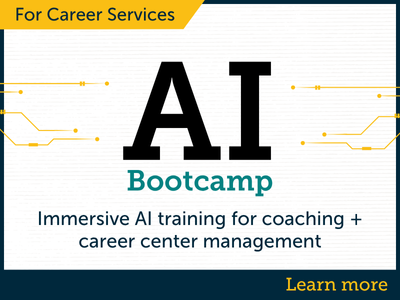University of Idaho Career Services created the “Career Services Internship Certificate Program” approximately five years ago to give undergraduate interns the knowledge, skills, and abilities to transition to the professional workforce. The reality that these interns could become professionals in career services, higher education, and recruitment is no accident.
“The Internship Certificate Program unites students from various majors and backgrounds under one common flag of career advocacy and readiness,” says Eric Anderson, director of University of Idaho Career Services.
“These young professionals are eager to serve, lead, and represent the office in multiple capacities.”
The program was partly the brainchild of one of the office’s former interns.
“This intern had such great ideas we hired her on full time,” Anderson says.
“I asked her about her internship experience. She said a lot of good things, but one thing stood out: She said that she worked the whole year and never realized there were other interns in the office. At the time, our interns were so siloed on their teams. We do a lot of collaborative work between the teams on the staff side; we felt we should be doing the same with our interns.”
2022 NACE Award Winner
University of Idaho Career Services is the winner of the 2022 NACE/Chevron Award winner for its “Career Services Internship Certificate Program.” See more information about the NACE Awards program and the full list of award winners/honorable mentions.In addition to developing a more robust internship program—one that could be modeled by other departments on campus—career services wanted to create a program in which students would be encouraged to work professionally in higher education, such as in career services, recruitment, or human resources.
“This is not just a job for us,” Anderson explains.
“We believe very strongly in the work that we do. We feel we need to help train the next workforce in career services and want students to become interested in career services at a younger age and realize that working in career services can be a rewarding career.”
Prior to starting the Internship Certificate Program, University of Idaho Career Services topped out at five interns per year. Currently, the office—which has 12 professional staff—has 23 interns.
Interns who participate in the Career Services Internship Certificate Program go through a series of professional development initiatives, cross-train, and work in interdisciplinary team projects that advance the mission of career services. The program is a progression: After each year, the interns are promoted in title, given a pay increase, and more responsibilities.
“We don’t want interns for just one semester or even one year,” Anderson explains.
“In the internship certificate program, interns do a year at a time and if they have a good experience and completed the assigned professional development exercises and attended the designated number of events, they could come back as an intern with a promotion and a pay increase.”
Students in their first year of the program are known as “interns” and then advance in title to “lead intern” in their second year. Third- and fourth-year program participants are “senior interns.”
“We treat all of our interns as staff, but our senior interns can do a lot of the work that a full-time staff member does,” Anderson says.
The Idaho Career Services office has interns run lead on projects.
“Our lead and senior interns run projects that a staff member could be doing,” Anderson says.
“Two of our graduating interns are our first-ever four-year interns. One was an advising intern. Before our program, our drop-in hours were always run by a professional career adviser. Our lead intern took a day of drop-ins this year. That’s a sign of the program’s success, that our interns are able to run drop-ins or college networking nights, which, in the past, staff members would have handled. We don’t do this to lessen the burden on our staff, but it has been a secondary benefit.”
Another benefit is eliminating the silos that had existed before the program’s implementation.
“Removing the siloes that existed in our internship program was a big outcome,” Anderson says.
“Our internship program is now very collaborative and strategic. Students want to do different things. They might like meeting with students, but they also might like event planning, marketing, or approving jobs. We made projects more collaborative so they could work together, get to know one another, and truly become a team.”
Anderson says that the catalysts for the early success of the University of Idaho Career Services Internship Certificate Program were securing buy-in from the entire office and picking outstanding internship supervisors.
“As part of the program, we created an internship supervisor work group,” he says.
“Once a month, the six internship supervisors meet to discuss what the interns are doing, what is coming up, project updates, plans for the future, new ideas, and more. These meetings of supervisors who are very passionate about the program have been instrumental to its success. They are committed to it and want to make it as successful as possible.”
Another key factor is selecting top students. The career services office posts the job in its career management system and requires submission of a resume and cover letter. Candidates are encouraged to explain why they are interested in the program, especially knowing that it is at minimum a one-year commitment.
“During the interview process, the key quality we are looking for is motivation,” Anderson explains.
“We don’t expect students to know what makes a resume effective or current best practices for interviewing or how to post a job in Handshake. We can teach them that. What we can’t teach is the interest to want to learn to do those things and the interest to want help students explore what they can do with their majors, grow, and become professionals.”
He adds that they are seeking students who desire to become good role models and advocates for career development.
“I’m always looking for the best students to work in our office,” Anderson says.
“We were very selective and hired some good people that first year. The opportunity we offer has spread by word of mouth. That is gold for us. Now, when students apply for one of our internships, they often apply because one of their friends told them about it.”
The proficiency of the program’s interns has attracted the attention of employers, as well.
“In the second year of the program, we lost all three of our advising interns within the first semester because our employers saw how capable they were doing their work at a career fair,” Anderson laughs.
“While we were paying the interns, the employers offered them a good deal more. We always joke that that was the first indicator that the program was working. Employers came to the career fair and wound up hiring away all of our interns because they were doing such great work.”
Each intern goes through a semester evaluation and another at the end of the year. Over the five years of the program, 95% of the non-graduating interns have returned the following year. Most years, the entire group of graduating interns land jobs early in the job-search cycle.
“This year, we had seven graduating senior interns,” Anderson says.
“They all had jobs by February. Through the Career Services Internship Certificate Program, these students were prepared and confident, and had developed career readiness skills that employers value and recognized as important for making a successful transition to the workforce.”







